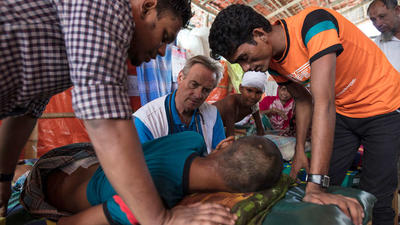Those arriving in Bangladesh have shared stories with Doctors Without Borders (MSF) about their villages being systematically raided and burnt by the Myanmar military.
Mob groups are targeting the Rohingya and women and children are being raped and killed.
It is one of the largest displacements of people in recent memory, in such a short period of time.
Recent surveys conducted by MSF in refugee settlements in Bangladesh estimate that at least 9,000 Rohingya died in Myanmar's Rakhine State between 25 August and 24 September 2017.
As 71.7 percent of the reported deaths were caused by violence, at least 6,700 Rohingya, in the most conservative estimations, have been killed, including at least 730 children below the age of five.
Who are the Rohingya?
The Rohingya are a stateless ethnic group, the majority of whom are Muslim, who have lived for centuries in the majority Buddhist Myanmar (also known as Burma).
However, Myanmar authorities contest this. They claim the Rohingya are Bengali immigrants who came to Myanmar in the 20th Century.
Described by the United Nations in 2013 as one of the most persecuted minorities in the world, the Rohingya are denied citizenship under Myanmar law. They lack basic services and opportunities including freedom of movement, healthcare, state education and civil service jobs.
ONGOING VIOLENCE AND PERSECUTION
Due to ongoing violence and persecution, hundreds of thousands of Rohingya have fled to neighbouring countries either by land or boat over the course of many decades.
In October 2016, violence in northern Rakhine state forced 60,000 Rohingya to flee to Bangladesh.
[Video: Understanding the Rohingya Refugee Crisis]
Humanitarian organisations are still blocked from accessing and operating in northern Rakhine. The Government of Myanmar has decided to work with only a select group of organisations in providing aid.
We are urging the Myanmar government for unfettered access to Rakhine State to ensure the impartial delivery of aid to those in need.
The Rohingya's situation in Bangladesh
Since 25 August, over 671,000 Rohingya refugees have fled from Myanmar into Bangladesh.
These refugees join hundreds of thousands of other Rohingya who fled violence in previous years and were already living in difficult conditions in Bangladesh.
Combined with the existing Rohingya refugee population, more than 900,377 refugees are now in Bangladesh.
Living conditions for the refugees need to be massively improved with a particular focus on improvements to water and sanitation, shelter and reducing population density.
Monsoon rains have already begun to damage the camps and due to deforestation in the camp, there is a high risk of landslides.
[Video: Kate Nolan, Monsoon rains]
In the current context of dense population and poor water and sanitation conditions, there is a high risk for the spread of disease. Already MSF has had to deal with the outbreak of diphtheria and measles in the camps.
What is Doctors Without Borders doing to help?
Since 1985, MSF has been present in Bangladesh in both the capital Dhaka and Cox’s Bazar, the coastal border town with Myanmar.
But with this recent and unprecedented influx of people, we have been forced to massively increase our capacity to respond, launching additional emergency projects in Cox’s Bazar.
As of March 2018:
- Health facilities: 10 health posts, 4 primary health centres (open around the clock), and 5 inpatient health facilities (providing 24-hour secondary healthcare)
- Staff: More than 2,800 national and international staff
- Patients: Our teams have carried out 351,421 outpatient and 8,135 inpatient consultations
- Health issues: Respiratory infections, diarrhoeal diseases, skin diseases – all related to poor living conditions
- Other activities: water and sanitation (water trucking, hand pump, tube well and latrine installation) and mental health services
We have treated more than 4,678 people for diphtheria in the Cox’s Bazar district as of the end of February, most of them aged between five and 14 years.
During the peak of the outbreak, we ran three dedicated health facilities. Diphtheria can result in a high number of deaths without the anti-toxin, but only a limited number has arrived in Bangladesh.
Between September and the end of February, we saw 4,370 cases of measles across all the MSF health facilities. Cases are now decreasing although the outbreak is far from over.
Last updated: 16 March 2018



